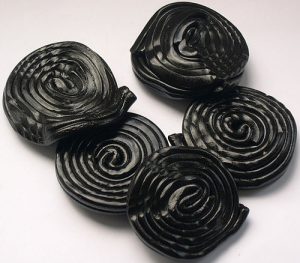I never liked black licorice.
Red, sure, but not black.
Tim McGovern of People reported in September a Massachusetts construction worker’s love of candy cost him his life.
 The 54-year-old, who has not been named, died in a fast-food restaurant while having lunch after consuming a bag and half of black licorice for a few weeks, a study by The New England Journal of Medicine.
The 54-year-old, who has not been named, died in a fast-food restaurant while having lunch after consuming a bag and half of black licorice for a few weeks, a study by The New England Journal of Medicine.
“He had a poor diet, consisting primarily of several packages of candy daily,” the study claimed, before noting that three “weeks earlier, he had switched the type of candy he was eating” to black licorice, the study found according to the Associated Press.
The study also said that licorice’s glycyrrhizic acid (usually found in the candy’s extract) can cause the “unimpeded presence of cortisol,” which in turn “can cause hypertension, hypokalemia, metabolic alkalosis, fatal arrhythmias, and renal failure — the constellation of signs and symptoms seen in this patient.”
The Journal’s findings listed the following as the diagnosis of Dr. Elazer R. Edelman, a doctor cited in the study: “Metabolic, renal, vascular, and cardiac toxic effects from apparent mineralocorticoid excess due to licorice consumption.”
The man, who suffered experienced “full-body shaking and loss of consciousness” before his death, also smoked a pack of cigarettes a day for 36 years and had a medical history that “included previous heroin use disorder and untreated hepatitis C virus infection.”
In 2018, a 73-year-old New Yorker filed a lawsuit against the Hershey Company, alleging that their Twizzlers black licorice candy contributed to his heart condition.
The New York Post first reported that David Goldberg, a Manhattan resident, has been “consuming at least one standard size bag per week” for “years,” according to Manhattan Supreme Court documents.
The lawsuit claimed that Goldberg is a “healthy individual who is not obese” and “has never had any heart conditions,” according to the Post, but had recently been diagnosed with atrial fibrillation (an irregular heartbeat.)
In February, the case was settled after it had been sent to arbitration in October 2019, according to Law 360.
In 2017, the FDA issued a warning against glycyrrhizin, a sweetening compound that is found in black licorice. The federal agency claims this ingredient can lower potassium levels which can lead to heart problems, and warns adults over 40 that “eating 2 ounces of black licorice a day for at least two weeks could land you in the hospital with an irregular heart rhythm or arrhythmia.”

